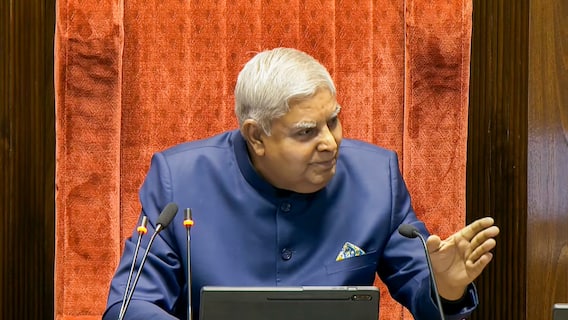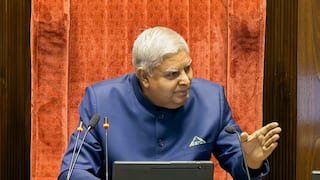Pakistan Economic Crisis: Oil Industry Warns Of 'Collapse' Amid Ongoing Liquidity Crisis
Pakistan Crisis: The country's economy has completely collapsed. Foreign currency reserves are in short supply, & cash-strapped oil companies have warned that the industry is on the edge of collapse.

Oil corporations that are cash-strapped in Pakistan have warned that the industry is on the verge of collapsing as the dollar liquidity crisis lingers and the cost of doing business rises due to the depreciation of the currency.
According to a Geo News report, the government withdrew the dollar cap to meet IMF demand, causing the Pakistani rupee to plunge to a historic low of Rs 276.58 in the interbank market.
The IMF has set many requirements for resuming the bailout, including a market-determined exchange rate for the local currency and a reduction in fuel subsidies, both of which have already been met by the government.
In a letter to the Oil and Gas Regulatory Authority (OGRA) and Energy Ministry, the Oil Companies Advisory Council (OCAC) said that the "sudden depreciation" of the rupee has caused losses worth billions of rupees to the industry as their letters of credit (LCs) are expected to be settled on the new rates, "whereas the related product has already been sold", it said.
According to the report, the government has also banned LCs due to low foreign exchange reserves, which fell to USD 3,086.2 million as of January 27, enough to fund only 18 days' worth of imports.
Pakistan is experiencing a balance of payments crisis, and the depreciation of the native currency is raising the cost of imported goods.
Energy accounts for a sizable portion of Pakistan's import bill. More than a third of the country's yearly power consumption is normally met by imported natural gas, the price of which skyrocketed following Russia's invasion of Ukraine.
According to the OCAC, these losses not only have an impact on the sector's profitability, which is already under pressure but also on its viability, because these setbacks may exceed the "entire year's earnings for the sector" in some situations.
As stated in the letter, OGRA has embraced the practice of not completely passing on the impact of rupee depreciation, instead imposing a massive burden on the sector.
Due to the challenges that the sector is still facing as a result of previous exchange rate adjustments and the enormous impact of the current depreciation, the OCAC stated that it is critical that OGRA pass the impact of exchange rates in one go and not stagger this compensation, according to the report.
The council also stated that since oil prices have risen and the Pakistani rupee has depreciated over the previous 18 months, the trade finance limits available to the industry from the banking sector have been insufficient.
Cnergyico, an oil refinery, informed the petroleum division hours after the notice was received that it would be shutting down operations for more than a week.
"This is to inform your office that the Cnergyico refinery will be shut down starting February 2, 2023 and will restart production from February 10, 2023, in accordance with our Crude oil vessel arrival timeline," the statement read.
Pakistan Economic Crisis:
Pakistan is experiencing a severe economic crisis. The economy of the country has entirely collapsed. Foreign Exchange Reserves are in low supply. Meanwhile, the Pakistani rupee's depreciation versus the US dollar continues. The Pakistani rupee has dropped to 276.58 per dollar.
The IMF's Executive Director, Dr Krishnamurthy Subramanian, has published a chart depicting the depreciation of the Pakistani rupee.
Pls look at this really interesting chart on the performance of the Pakistani Rupee vis-a-vis INR pre- and post Demonetisation. Slope is decreasing till Nov 2016 when Demonetisation occurred. After that, slope is consistently positive, ie depreciation wrt INR!!?? pic.twitter.com/nVFlQtgETW
— Dr. Krishnamurthy Subramanian (@SubramanianKri) February 3, 2023
Dr Krishnamurthy Subramaniam posted an interesting graphic of January 18 on social media. According to this chart, the Pakistani Rupee was in a strong position at the time of Demonetisation in India. Even yet, the Pakistani rupee was undervalued in contrast to the Indian rupee. Following demonetisation, the Indian rupee gained a significant advantage over the Pakistani rupee.
According to the State Bank of Pakistan (SBP), the dollar reached a record high of Rs 276.58 in the interbank currency market on Friday (February 3). The US dollar closed at Rs 271.36 earlier on February 2, according to official statistics.
According to Reza Baqir, former governor of the State Bank of Pakistan, the country's foreign exchange reserves and exports are directly affecting the value of the Pakistani rupee.
Pakistan Blocks Wikipedia:
Pakistan has blocked the online encyclopaedia Wikipedia for failing to delete inflammatory or blasphemous content, the country's telecommunication authorities announced on Saturday, news agency PTI reported.
The blacklisting of Wikipedia comes only days after the Pakistan Telecom Authority (PTA) reduced Wikipedia services for 48 hours and threatened to shut it if 'blasphemous' information was not removed, as per the report.
The Wikimedia Foundation hosts Wikipedia, a free online encyclopaedia written and edited by volunteers all around the world.
According to PTA spokesperson Malahat Obaid, the restriction was mostly issued due to noncompliance with the directives, the report said.
“The decision can be reviewed once Wikipedia removes sacrilegious content that has been identified by the regulatory authority,” the spokesperson added, according to the report.
Facebook and YouTube have already been blocked due to content deemed blasphemous.
The PTA issued complaints to Wikipedia and Google Inc in December 2020 for "disseminating sacrilegious content," while the country restricted YouTube from 2012 to 2016.
Pakistan has also blocked TikTok multiple times in recent years for failing to cease publishing "indecent" and "immoral" content.
In Muslim-majority Pakistan, blasphemy is a delicate subject.
(With Inputs From Agencies)
Trending News
Top Headlines






































